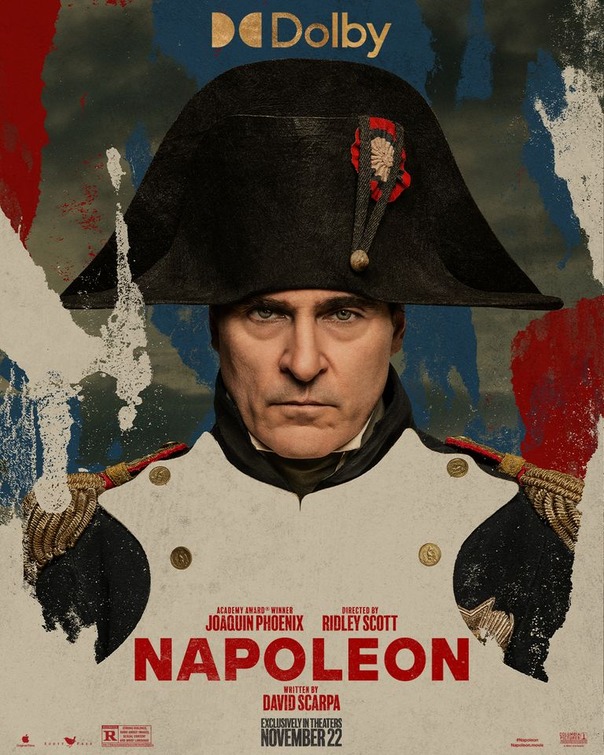"The General’s Greatest Hits"

| None | Light | Moderate | Heavy | |
|---|---|---|---|---|
| Language | ||||
| Violence | ||||
| Sex | ||||
| Nudity |
What You Need To Know:
NAPOLEON is beautifully filmed by Director Ridley Scott, with spectacular, violent battle scenes and attention to period detail, costuming and set design. However, as a biography, NAPOLEON reduces Napoleon Bonaparte’s character to animalistic, childlike appetites of ambition, sex and power. It skips over his desire for social order, his patriotic allegiance to France and his commitment to the French Enlightenment, mitigated by his government’s reconciliation with the Catholic Church.
Content:
More Detail:
NAPOLEON stars Joaquin Phoenix as the famous French general and Emperor of France in Director Ridley Scott’s ambitious movie about Napoleon, which focuses on Napoleon’s military career and his relationship with his wife, Josephine, the love of Napoleon’s life. NAPOLEON is beautifully filmed, with spectacular, though violent, battle sequences and incredible attention to period detail, costuming and set design, but the movie reduces Napoleon Bonaparte to animalistic appetites of ambition, sex and power, skipping over his desire for social order, his patriotic allegiance to France and his commitment to the values of the French Enlightenment, which was mitigated by his government’s reconciliation the Catholic Church.
The movie opens with the French Revolution in 1789, the brutal execution of Marie Antionette and the Reign of Terror under Maximilian Robespierre in 1793. In September, Napoleon is appointed Artillery Commander during the siege of the southern French city of Toulon, where French royalists were being supported by British naval ships. In December, Napoleon carries out a plan to capture a hill and drive the British Navy away so that the French Republic could take the city. He was appointed Brigadier General, then in July of 1794, Robespierre was removed from office and executed, along with his brother Augustin, Napoleon’s patron in the government.
Cut to October 1795, when General Napoleon is appointed by Paul Barras, a government leader, to put down a royalist revolt. Napoleon fires a round of artillery shells into a crowd of protestors, leading to bloody results. Napoleon’s actions strengthen the new French government. Meanwhile, Barras invites Napoleon to a party, where he meets Josephine, a widow with two children. They become romantically involved and get married six months later, even though it’s clear that Josephine’s feelings are not as strong as Napoleon’s.
The movie suddenly cuts to three years later, where Napoleon is staring at the Sphinx in Egypt. He hurries home to Paris when he learns that Josephine is cheating on him with a young officer. They hash things out. Then, in November 1799, he leads a coup against the French government and is appointed First Consul, effectively a military dictator.
The rest of the movie tells how Napoleon meets several military challenges to his reign. It culminates in Napoleon being declared Emperor of France in 1804. This led to victories over Britain, Austria and Russia in the next five years. War broke out again in 1812 against Russia. Napoleon decides to invade Russia. However, after a great initial success, Naoleon’s army undergoes a disastrous retreat, including plague, that killed some 350,000 troops. The retreat awakened hope in the other European countries, including Britain, Prussia, Austria, and Sweden, and a new coalition to defeat Napoleon was formed.
Meanwhile, Napoleon divorces Josephine in 1810 when she fails to produce an heir, and he marries an 18-year-old Austrian princess to cement the victory he won over Austria in 1809. At that time, Napoleon was still sitting pretty, at the top, but his downfall would come soon, and swiftly.
NAPOLEON is beautifully filmed by Director Ridley Scott and his team, with spectacular battle sequences and incredible attention to period detail, costuming and set design. Perhaps the most impressive battle sequence is Napoleon’s victory at Austerlitz, where the movie depicts Austrian and Russian troops being shelled by French troops and falling through the ice of some large ponds.
However, as a biography, NAPOLEON reduces Napoleon Bonaparte’s character to animalistic, sometimes childlike appetites of ambition, sex and power. It skips over Napoleon’s desire for social order, as seen in his adoption of the Napoleonic Code in legal matters and his many public works in Paris, which helped make the city the jewel it’s known as today. Nor does it say much about Napoleon’s patriotic allegiance to France, which was totally tied to his infamous personal ambition. The movie also doesn’t say much about Napoleon’s commitment to the French Revolution and its Enlightenment values and ideals. Also, during the early days of his rule, Napoleon reconciled with the Catholic Church, recognizing it as the majority church of France. The power still tilted toward the State, of course.
The upshot of all this is that viewers don’t really get much new insight into Napoleon the man.



 - Content:
- Content: 


